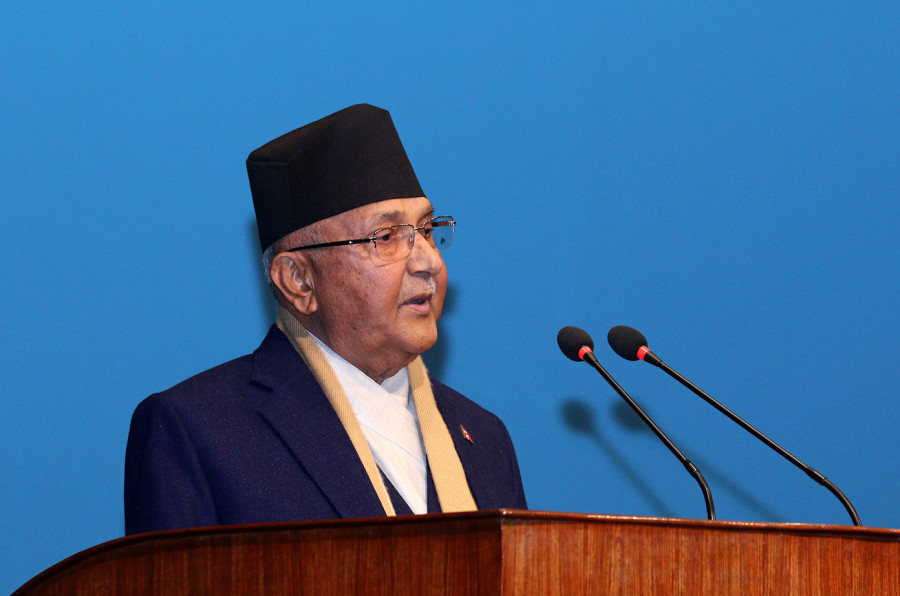Politics
Oli presents a rosy picture of his two years in office, but not all agree
A government with a majority could have done much more but it has been a run-of-the-mill performance, analysts say.
Binod Ghimire
Unless there is an emergency, Parliament meetings are rarely held in Nepal on Saturdays. But Prime Minister KP Sharma Oli, who completed his two years in office on Saturday, wanted to address the House. Since Friday’s House meeting ended after passing a condolence message on the death of Durga Prasad Upadhyay, a National Assembly member from Nepali Congress, Oli rescheduled his address for Saturday.
Oli was keen on listing his administration’s “achievements” this time as he was unable to address Parliament last year, when he had completed his first year in office, as the Nepali Congress obstructed the House proceedings.
This time, Oli, in his speech which lasted one hour and 10 minutes, tried to present a rosy picture of his tenure.
Promulgation of the laws, advancement in infrastructure development, progress in curbing corruption, improvement in social indicators and improved bilateral relations were among those which Oli counted as his achievements.
Last year, Oli had claimed that the first year would be the year of creating the foundation by drafting needed laws and setting up mechanisms for functional federalism. “Results would be visible from the second year,” he had said.
But there was a slight change in his remarks on Saturday, as he said unstable governments work on populist agenda, a stable government like his works with a long-term vision. “Therefore, results are not visible overnight,” he said.
Yet he counted a number of works his government accomplished in the last 731 days into power.
He said 55 new laws have come into force while 201 were amended to align them with the new constitution. He, however, made no mention of several federal laws including on Education and Health, which the government is yet to register in Parliament, say political experts.
The local and provincial governments have not been able to exercise their constitutional powers in the lack of the laws, more than four years since the Constitution of Nepal was promulgated.
Talking about some of the bills his government has introduced that courted controversy for trying to curtail freedom, Oli said he, who fought for liberty and freedom all his life, can never think of taking any regressive steps.
“The bills are only drafts which can be revised after transparent discussions in Parliament,” said Oli. “It is unfortunate that communist parties face trials in every step because they are communists. Actions need to be judged, not the name.”
Political experts, however, say the incumbent government is being criticised for its actions, not because of the name of the party that is in power.
Its steps to arrest singers, introduce bills aimed at attacking freedom of expression and curtailing the authority of constitutional commissions give ample room to suspect its intention, they say.
“Civil and political space has shrunk under Oli,” Chandra Dev Bhatta, a political commentator, told the Post. “His actions are responsible for it.”
In his address, Oli said it is a matter of pride that Nepal is among the 10 countries that have the highest GDP growth rate. He said for the last three years the country has consistently maintained above 6.5 percent growth rate which otherwise was limited to 4 percent for a decade since Nepal turned a republic. He went on to say that his government has added jobs to the extent that a majority of the new workforce is getting jobs by the time it enters into the job market.
However, he contradicted himself saying the present education system is producing learned unemployed “as our universities don’t provide skills along with the study”.
He said Nepal’s education system needs to be revamped to make the technical and general education ratio at 70:30.
“There are many contradictions within Oli’s claim,” said Bal Krishna Khand, chief whip of the main opposition Nepali Congress. “There is no enough foreign direct investment, the capital expenditure is poor but the government boasts of a high growth rate. How is that even possible.”
On Wednesday, the government revised its budget to make it smaller by 10 percent.
Oli had claimed Nepal has made tremendous progress in social indicators like human development index, doing business, fighting hunger and improving peace and rule of law. He also said different international studies have shown the country has leapt forward in gender equality, lessening corruption and competitive tourism. He said Nepal is on the path not just of reducing poverty but eradicating it.
Analysts, however, disagree.
Hari Roka, a political analyst who also follows economics, said the government’s progress is gauged on three fronts.
First, whether it has brought changes in the lives of general people; second, if the country has improved in investment and reaping benefits from it; and third the situation of imports and exports, according to Roka.
“I see the government failing on all three fronts,” Roka told the Post. “The government with a huge majority could have achieved a lot but sadly two years of the Oli government is nothing but like any other government’s.”




 17.12°C Kathmandu
17.12°C Kathmandu















